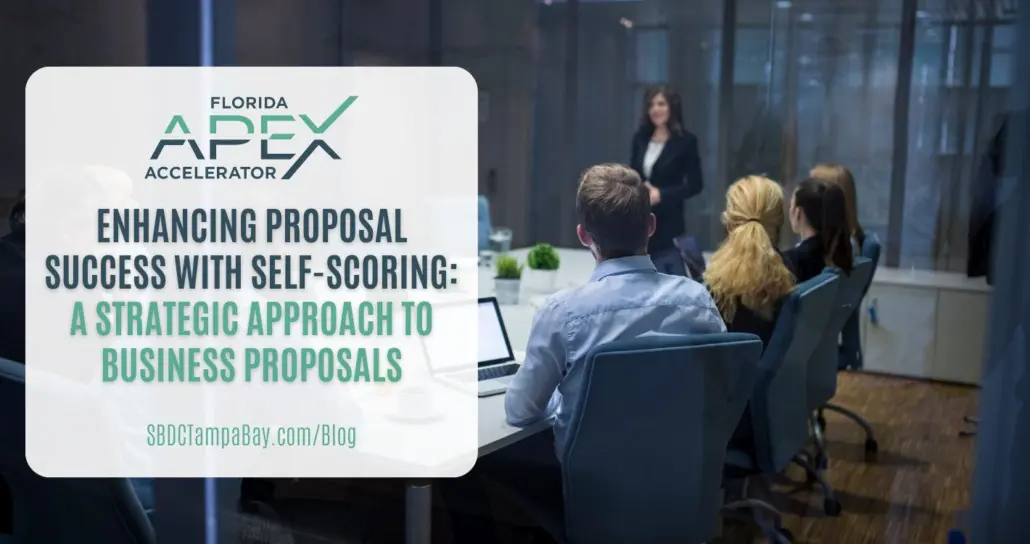Enhancing Proposal Success with Self-Scoring: A Strategic Approach to Business Proposals

by Yolanda Goodloe | January 31, 2024
In the fiercely competitive landscape of business, winning contracts and securing projects often hinges on the strength of your proposals. Crafting a compelling proposal that stands out from the competition is no easy feat. However, there’s a transformative approach gaining momentum in the business world – the concept of self-scoring proposals. Traditionally, proposal evaluation has been a subjective process, with decision-makers relying on personal judgment and experience to assess the merits of each proposal. However, self-scoring proposals introduce a more structured and objective approach to the evaluation process. This blog post explores the concept of self-scoring proposals, their significance, and how businesses can leverage this method to improve their proposal success rate.
The Self-Scoring Proposal
A self-scoring proposal is a strategic tool that incorporates a scoring system, allowing proposers to assess their submissions against predetermined criteria or standards. This method enables proposers to critically evaluate their proposals, identify strengths, and address weaknesses before presenting them to evaluators. Several federal agencies, including the General Services Administration (GSA), have embraced self-scoring solicitations as an innovative type of U.S. federal contract vehicle. This approach seeks to reduce government expenditures while actively engaging contractors in the evaluation process, enabling them to gain insights into their strengths and areas for improvement.
The Significance of Self-Scoring Proposals
The core idea behind self-scoring proposals is to provide businesses with a systematic framework for assessing and scoring their own proposals. This involves creating a set of predefined criteria and metrics that align with the client’s requirements and project goals. By self-evaluating their proposals against these criteria, businesses gain valuable insights into the strengths and weaknesses of their submissions. Engaging in the practice of self-scoring business qualifications offers a range of advantages that contribute to overall proposal excellence. Through self-scoring, businesses gain a comprehensive understanding of the specific requirements, enabling them to tailor their submissions with precision. Moreover, the early identification of strengths and weaknesses is a key advantage. By recognizing potential shortcomings in advance, businesses can proactively address and rectify these areas, ultimately enhancing the overall quality of their proposals.
Furthermore, the adoption of self-scoring contributes to increased competitiveness. Businesses that showcase a thorough understanding of the proposal requirements position themselves as formidable contenders in the evaluation process, significantly elevating their likelihood of success. This approach allows businesses to present a clear and concise overview of their capabilities, fostering effective communication and aiding evaluators in comprehensively assessing the merits of each proposal.
Leveraging Self-Scoring Proposals for Success
Leveraging self-scoring proposals is pivotal for achieving success in the competitive landscape of government contracts. This practice not only enhances clarity in proposal requirements but also empowers businesses to proactively identify and address weaknesses, positioning them as strong contenders and fostering effective communication with evaluators. The federal government, particularly through agencies like the Small Business Administration (SBA), employs self-scoring proposals in certain instances. For example, the SBA’s Small Business Innovation Research (SBIR) and Small Business Technology Transfer (STTR) programs require applicants to employ a self-scoring system for proposal evaluation.
Criteria For Self-Evaluation
The criteria for self-evaluation may vary based on the context and proposal requirements. However, common factors include compliance with requirements, technical merit, budget and cost effectiveness, experience and qualifications, innovativeness, and organizational capacity. While some federal agencies may use self-scoring for contracts or grants, it is not a universal practice. The government’s evaluation methods vary, including peer reviews, expert panels, and self-scoring, depending on specific proposal requirements.
In the dynamic landscape of business proposals, adopting innovative methods to enhance competitiveness is crucial. One such approach gaining traction is the use of self-scoring proposals. Self-scoring proposals stand as a powerful tool in the arsenal of businesses seeking success in proposal submissions. By fostering early identification of strengths and weaknesses, enhancing clarity, and facilitating effective communication, self-scoring provides a strategic advantage. Mastering the art of self-scoring is not just a business strategy; it’s a pathway to success. While its use in government evaluations varies, businesses can leverage this approach to refine their proposals, increase competitiveness, and elevate their chances of securing opportunities in the fiercely competitive business world.





Yolanda Goodloe
Consultants, Cowart, Government Contracting Consultants, PinellasSpecialty: Procurement Yolanda Goodloe has more than 20 years of experience in public service at the local and municipal levels. Early in her career, she worked as a human resources and relations professional while serving as a liaison to the business community and advocacy groups. Her prior experience includes being a human relations specialist for Lee County Government, and an equal opportunity director for the City of Fort Lauderdale. Her background combines public service and human relations experience with hands on leadership in equal opportunity, supplier diversity, business certifications programs, organizational training and development, and managing workforce diversity principles. Goodloe is the procurement specialist for the Florida PTAC at Pinellas County Economic Development. She connects businesses to resources and tools for state, local, and federal contracting opportunities. She is a Certified Procurement Professional (CPP), a Supply Chain Management Professional (SCMP), and a Certified Verification Counselor. She graduated from Florida State University with a bachelor of arts in political science and history.